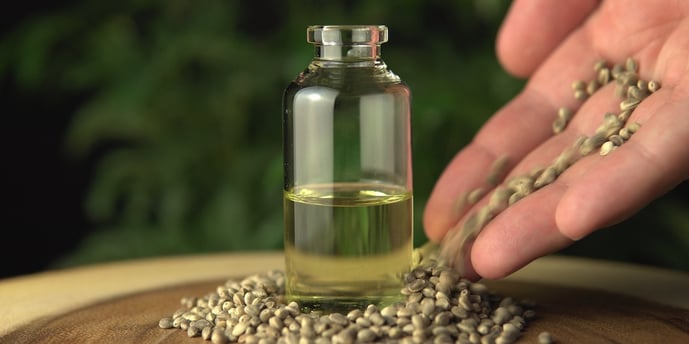How to Extract CBD from Hemp: All You Need to Know for the Best Results
Justin Klinger, Apr 22, 2021 6:30:00 AM

Cannabidiol, or CBD, is the second most abundant active ingredient in cannabis.
Unlike tetrahydrocannabinol, or THC, CBD does not cause intoxication — yet it is a highly sought-after constituent of the cannabis plant and is the focus of research into its potential value in treatments for medical conditions including anxiety, insomnia, and chronic pain.
Hemp extract is increasingly popular among consumers, but quality and purity concerns abound, and differentiating your product based on reliable, consistent quality and purity is critical.
Several processes are available to extract this vital phytocannabinoid from hemp, and the extraction method you choose contributes to the final potency and quality of your CBD extract or oil product. Commonly used hemp extraction processes include:
- Supercritical CO2 extraction
- Solvent extraction
- Steam distillation
- Oil extraction
Each hemp extraction method presents pros and cons that range from whether they produce a CBD rich extract, quantity of raw plant material needed, time and cost requirements, and product purity.
Decarboxylation: An Essential Step Toward Quality CBD Oil and Extract
Decarboxylation is a fundamental step in the chemistry of hemp processing. The raw hemp plant contains mostly cannabidiolic acid, or CBDA, which needs to be converted to achieve ideal bioavailability.
Applying heat to the milled hemp plant material causes a chemical reaction that removes a carboxyl group from CBDA and releases carbon dioxide, converting it into high-value, therapeutic, active CBD. Curing and drying the hemp flowers effectively converts some of this important substance, but the best results are achieved through application of specific temperatures in a controlled environment.
CO2 Hemp Extraction: The Standard Extraction Method for Purity
Carbon dioxide at very low temperature and high pressure reaches its supercritical state, at which it has properties of both gas and liquid. In this state, it is ideally suited as a solvent for the gentle extraction of pure, high-quality CBD products from hemp with no solvent residue and high extract yields of products including:
- Full spectrum oil
- Full spectrum distillate oil
- Broad spectrum distillate oil (THC non-detect)
- Isolates
Supercritical CO2 allows extraction experts to control temperature and pressure to finely tune target compound ratios without exposing the product to extreme temperatures that can affect product quality.
So in expert hands, supercritical carbon dioxide can pinpoint desired molecules to extract only essential compounds such as CO2 CBD oil, and leaves behind other compounds that would otherwise degrade the product or require further processing to remove. Any CO2 that remains after extraction simply evaporates at room temperature.
Carbon dioxide is more environmentally friendly than most typical solvents, and it can be recovered and recycled in processing. In addition, CO2 destroys many bacteria and molds.
This extraction method involves expensive equipment and specialized expertise, but it’s generally agreed to produce the best hemp products with high CBD concentration and excellent, efficient yields.
Solvent Extraction
Chemical solvent extraction is generally a lower-cost option, but the utmost care is needed to ensure that hemp oils and extracts derived using solvents are safe. Solvents commonly used in hemp extraction include alcohols and hydrocarbons including ethanol, butane, hexane, and propane, and others Generally Recognized as Safe (GRAS) under FDA guidelines.
Of course, a safe, pure, solvent-free CBD oil or extract is the product goal, so product sampling and analysis for residual solvents is critical. Gas chromatography/mass spectroscopy is an efficient technique for identifying residues. Product testing and analysis can ensure quality, efficacy, and safety with values for:
- Residual solvents
- Potency profiles
- Moisture
- Heavy metals
- Pesticides
- Microbes
- Terpenes
- And more
Steam Distillation of Hemp Oil
Steam distillation is one of the oldest botanical processing methods available. Water is heated to produce steam, which passes through the plant material, freeing the oil from the plant structures. The steam and oil vapors are collected and condensed, and the oil and water are then separated.
Steam distillation is a simple and straightforward process that requires less expertise and specialized equipment than other methods, but in most cases, it’s an inefficient process. It leaves behind a significant amount of essential oil, meaning lower yields. In addition, the high temperatures required to produce and maintain steam can degrade product quality.
Because of both its inefficiency for producing good yields and its risk of damaging the hemp’s active compounds, steam distillation is not recommended for quality CBD extract production.
Extraction Methods for Tinctures & Topicals
The use of oil, alcohol, or water to extract CBD from hemp by soaking is typically used by small-batch, at-home processors to make tinctures or products for direct, topical use on the skin. In this method, plant material is milled and added to oil, alcohol, or water, where over time, the cannabinoids dissolve into the carrier fluid.
These traditional methods are far less efficient, and process variables can be difficult to control.
Choose a Toll Processor With Expertise in CBD Extraction
Processing CBD oils and extracts from hemp for use in products including food ingredients, cosmetics, nutraceuticals, and supplements means it’s essential to know your toll processing partner is properly accredited and certified. Certification means you can trust your toll processor to comply with necessary regulations for safety and quality.
That’s why it’s essential to ask your toll manufacturer about their quality assurance program. ISO 9001, FSMA, and cGMP certification are simply a must. As consumers seek out organic products, a toll processor certified through a trusted organic accreditation authority can help add value to your organically grown hemp products.
Learn more with our Hemp: Biomass to Bottle eBook. Click the button below to download your copy.


